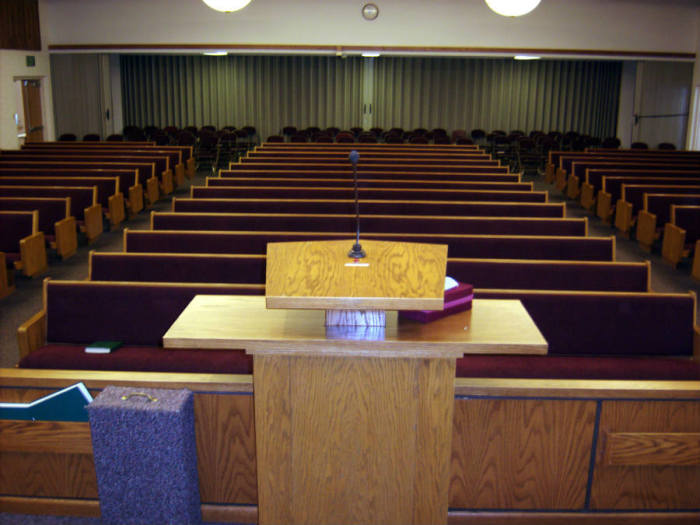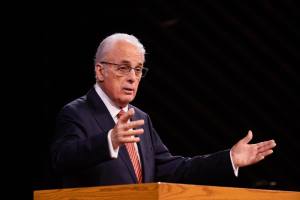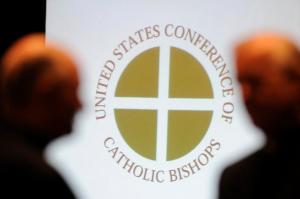Author Talks 'Unheralded Heroines' of US Christianity, 'Conservative Pushback' Against Women in Leadership

Building the Old Time Religion: Women Evangelists in the Progressive Era takes an in-depth look at the lasting impact that the ministry and achievements of 24 women have made on U.S. Christianity. These women founded educational institutions, organizations and denominations during the Progressive Era and many of their contributions remain pivotal to American society today.
They range in name from Virginia Moss, Elizabeth Baker, Mary Lee Cagle, Emma Whittemore and Martha Lee to Iva Durham Vennard, Aimee Semple McPherson, Helen Sunday, Evangeline Booth and several others. Their denominations include Methodist, Roman Catholic, Salvation Army, Assembly of God, Pentecostal, and others. Among the many institutions and churches these women founded are the Catholic Truth Guild, Apostolic Faith Mission, Door of Hope, Good Will Mission, L.I.F.E. Bible College, Angelus Temple and Beulah Heights Assembly.
According to theologian and author Priscilla Pope-Levison, the 24 women evangelists featured in Building the Old Time religion broke ground and pressed against the tide of the times to follow and fulfill the calls they felt God had placed on their lives. Pope-Levison, professor of Theology at Seattle Pacific University and an ordained United Methodist minister compresses 20 years of research into less than 200 pages and leaves no stone unturned in her effort to reveal the accomplishments, struggles and shortcomings of these "theologically conservative" Christian leaders.
Below is an edited transcript of The Christian Post's interview with Pope-Levison. Read part one of CP's interview with the author: 'Building the Old Time Religion' Explores Women Evangelists' Monumental Impact on US Christianity.
CP: Can you name a few ways in which these women have left a lasting impact on Christianity in America? Institutions, of course are obvious. But is there anything they established that remain with us today that Christians might not be aware of?
Pope-Levison: I think they really broke the ground for women's religious leadership within mainline Christianity in terms of mixed-gender institutions. In other words, they were among the first women in mainline Christianity to have religious authority over women and men. That to me is a legacy that paved the way for those of us today who are ordained, who are serving as pastors, theological teachers.
This is part of the critical piece that's been missing, in my opinion, from how this story is told. We look so quickly to theological seminaries and yet the religious training schools that these women founded were training women and men for church leadership as pastors, Bible teachers, missionaries, evangelists, and musicians long before Protestant seminaries let women in, particularly in the 1950s and on.
So this is a critical piece for those of us who support women's ordination and support the full range of women and religious leadership within Protestant Christianity, and they've been overlooked by everybody in my opinion. … I think the other part of their legacy I alluded to earlier — how will those in power, authority and leadership make room for people like these women who felt called by God to preach, to evangelize and yet the institution at that point told them no? I wonder how often we continue that today. They were forced to found their own institutions to follow their call. When it happens from unexpected places, I wonder how well the institutional church listens to those people.
 2 photos(Photo: NYU Press)Building the Old Time Religion: Women Evangelists in the Progressive Era (Dec. 2013, NYU Press), by Priscilla Pope-Levison.
2 photos(Photo: NYU Press)Building the Old Time Religion: Women Evangelists in the Progressive Era (Dec. 2013, NYU Press), by Priscilla Pope-Levison.CP: What were some of the other conflicts these women encountered specifically on Christian issues, such as stances on conversion, sanctification, etc.?
Pope-Levison: These women were theologically conservative, we would probably certainly call them evangelical today and maybe even some of them fundamentalist. They are challenging the mainline Church on issues, as you mentioned, [like] conversion. They absolutely believed that one had to give evidence of a moment of conversion, like the Apostle Paul.
Many in the mainline church had come to a point where they believed that conversion was something that you were in a sense experiencing throughout your life. As you grew, attended church and attended Sunday school, you would just kind of morph into conversion. It was a lifelong process. And they were much more dramatic-moment -centered in conversion. It was the same with sanctification, the second experience of grace. That was a very crisis-experiential experience. They are considered probably hopelessly conservative by the mainline church, particularly this is the mainline Methodist Church, so that's an area of conflict for them. ...
I would say that another area is many of these women were very authoritative themselves and they were not eager to share power with anyone, except if it were their son. In this case, only one of them had a daughter and she kind of fell out of the family. So most of these women who founded particularly churches (and) denominations ended up handing on the reins of leadership to their sons, which is very interesting.
I think in some senses they had to be quite authoritative in order to establish this work from the beginning but what my critique would be is that they didn't have to remain authoritative. Yet very few of them really ever shared power with anyone. That's one of the ways that I find Vennard very different from the others. Aimee Semple McPherson, when she died was pretty much on her own [and] had even fallen out of graces with her family, including her daughter and her mother.
These ended up being very authoritative, isolated religious leaders which I think we still see a lot of today. It still isn't a good model for the Christian community. That's another lesson I think we could learn from these women, is that that leaves a lot of people on the margins and it leaves the leader isolated and thinking that he or she has a hold on God's truth, and I think that's a very dangerous way to be a leader of any sort but particularly a religious leader. So that caused a lot of conflict. It was the sense of you either agree with me and support my doctrine, or here's the door. Sometimes I wonder if we've learned very much in the last century. You know, that's still happening today.
CP: What are some of the ways in which McPherson benefited from the foundation that these women laid, perhaps in ways that may not be readily acknowledged or readily visible?
Pope-Levison: That's what I argue in the conclusion of the book. A lot of people know who she is, and what I don't think has been well-documented is that she didn't arrive just from nothing, in the sense that there was at least a generation of women doing the evangelism like she did at the beginning. She wasn't just a phenomenon on her own that arose and then sort of died away, as if there weren't women preceding her or women after her.
What I argue in the conclusion is that the four types of institutions, and I devote a chapter to each one, are the same kinds of institutions that she founded. What I attempt to draw is the connection between what these women were doing, building institutions, and what McPherson did with such success. No one is arguing that she wasn't the most successful woman evangelist, and I would argue probably the most successful evangelist of any sort in the first half of the 20th century.
CP: In the aspect of women leaders raising up other women leaders, do you see that going on today?
Pope-Levison: For the most part, they didn't do a good job of mentoring other women and it's hard to know whether that was deliberate or whether it was just happenstance. There was some mentoring. Certainly McPherson in her denomination that she founded, the Foursquare Gospel Church, there were women ministers, she had women teachers in Bible college and so forth. But by and large, most of the women in this book who founded institutions did not do a very good job of mentoring other women. In every case, there was not another woman who took over from the founder. It was a male and it was generally a son or two, so that's an interesting observation in and of itself.
There's a lot more attention, I would say, today in terms of mentoring women into religious leadership. I think it's certainly more apparent than it was a century ago. I think of what my work and of my colleagues' work here as well at Seattle Pacific University with mentoring women in theology and so forth. We have a women in ministry group that meets on a regular basis. So I think there is a lot more attention to the importance, to the need, and for the fact that there are a lot of women feeling called to some sort of religious work. I think we're doing a much better job of mentoring younger women or women coming out of a different career into the ministry. Now this is certainly going to be in places where there's an openness to women in ministry, so that needs to be said as well.




























